新编大学英语第四册-Unit-7--College-Life---课件
新编大学英语(第四版)综合教程3教学课件u7-2
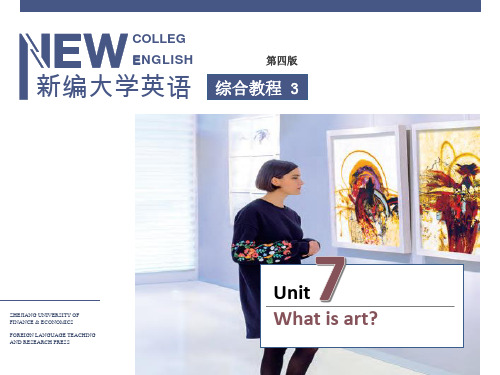
Reading 2 Text exploration
Sample answer:
1) Artificial intelligence As you can imagine, creating these replicas via crowdsourced 2D images is extremely laborious and time-consuming. Increasingly, artificial intelligence algorithms are being used to do all the required sourcing, allowing enormous amounts of images to be cross-referenced and stored in a matter of hours. This will enable even more accurate and extensive archiving and even better replicas to be created.
Reading 2 Text exploration
Pre-reading questions
Wherever we go, we are surrounded by history. Across the globe, cultural heritage is passed down through the generations. It is in the buildings and structures around us. It is in the art and artifacts we treasure. It lives in the language we speak and the stories we tell. Technology is often seen as something that destroys the past — but ironically, it is now the most essential weapon in the battle. How is technology preserving our cultural heritage?
教学课件大学英语教程第四册
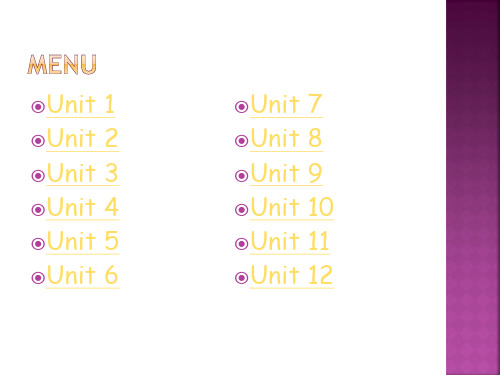
MBA program 工商管理硕士课程 course/program 课程 study abroad 留学 liberal arts 文科 brain drain 人才流失 liberal education 人文教育 transcript 成绩单 humanities 人文 4-year path 四年制 paper 论文 cram ( 考前) 死记硬背 thesis 毕业论文 faculty ( 学校里的) 教职人员
well-known in artistic circles 在艺术圈里闻名。
3. Through a period of more than half a century of combination and integration of various kinds of opera there evolved the present Beijing Opera, the biggest kind of opera in China, whose richness of repertoire, great number of artists of performance and of audiences, and profound influence are incomparable in China.
我忍受不了交通噪音。
Playing volleyball just isn’t my cup of tea.
我不喜欢打排球。
He doesn’t care too much for classical music.
他不太喜欢古典音乐。
the goal of education 教育目的 university ( 综合性) 大学 attach importance to education 重视教育 science student 理科学生 quality-oriented education 素质教育 engineering student 工科学生 exam-oriented education 应试教育 campus 大学校园 cheat in exams 考试作弊 bachelor’s degree 学士学位 creative thinking 创造性思维 master’s degree 硕士学位 study load 学习负担 doctor’s degree 博士学位 diploma 文凭 educational reform 教育改革
新视野大学英语第三版第四册第七单元Section A课件
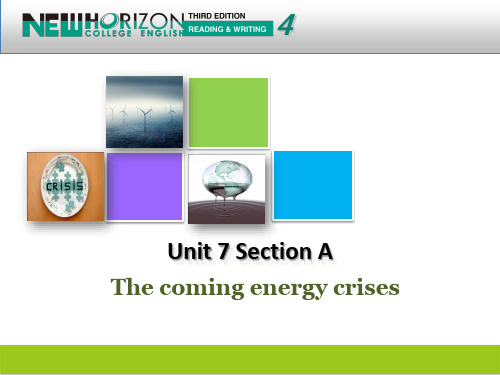
Always Sometimes
Never
8. Do you use or encourage your parents to use the washing machine on a cool wash whenever possible? 9. Do you use or encourage your parents to use energy efficient bulbs instead of the traditional ones? 10. Do you walk or encourage your parents to walk rather than drive when going shopping nearby your home?
Tips
Discussion Questions
1 Is it important to conserve energy? Why do you think so?
Yes, it’s definitely important to conserve energy. There are several reasons. First, it reduces our consumption of fossil fuels which have a fixed quantity of availability and are rapidly diminishing. Second, it saves us money because we don’t have to build more power plants. Third, it reduces carbon emission, which will contribute greatly to the improvement of our air quality and natural environment.
新编大学英语4unit
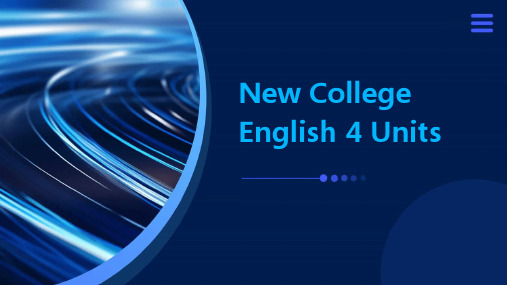
句子结构分析
在New College English 4中,有许多复杂的句子结构需要分析。这包括长句子的结构分析、从句的类型和用法、以及句子成分的划分等。通过分析句子结构,学生可以更好地理解句子的含义和逻辑关系。
句子翻译
除了分析句子结构,学生还需要学会如何将这些句子翻译成中文。这需要学生掌握一定的翻译技巧,如直译和意译的选择、句子重心的转移等,以便更准确地传达原文的含义。
Main Theme
Analysis of Text Content
CATALOGUE
02
02
01
04
03
词汇理解
除了理解词汇的含义,学生还需要学会如何在实际语境中运用这些词汇。这包括选择合适的词汇进行表达,以及根据语境判断词汇的准确含义。
词汇运用
在New College English 4的教材中,有许多生词和短语需要理解和学习。这些词汇和短语通常具有多种含义和用法,需要仔细分析和理解。
Literary Movement
The text belongs to the Victorian era, a period known for its emphasis on sentimentality, morality, and social reform. It reflects the values and beliefs of the time.
答案: C
解析: C选项中的描述与文中第三段的内容相符,是正确答案。文中提到“...the company has a good reputation in the market”,这与C选项中的“the company has a good reputation”相一致。
全新版大学英语综合教程第四册第四单元PPT课件

1. Did global trade exist in the past? What did people doing global trade think of it then?
Yes, global trade has been around for centuries. In the past, the corporations and countries that benefited from global trade were largely content to treat vast parts of the world as places to mine natural resources or sell finished products.
While Reading
Words
Grammar
Unit 4 Globalization
Text A In Search of Davos Man 寻找达沃斯人
2021
1
Before Reading
While Reading
Words
Grammar
马云用手机扫码花38888元买走了今 年双11的第一单,刚刚从日本运来的 蓝鳍金枪鱼。
The latter, although an Australian by birth and spending
of his adult life outside the US, holds his Us citizenship
dear.
2021
Back 12
Before Reading
While Reading
( T)
6. Professor Samuel Huntington describes Davos Man as an
Unit-7-College-Life新编大学英语第二版第四册课文翻译
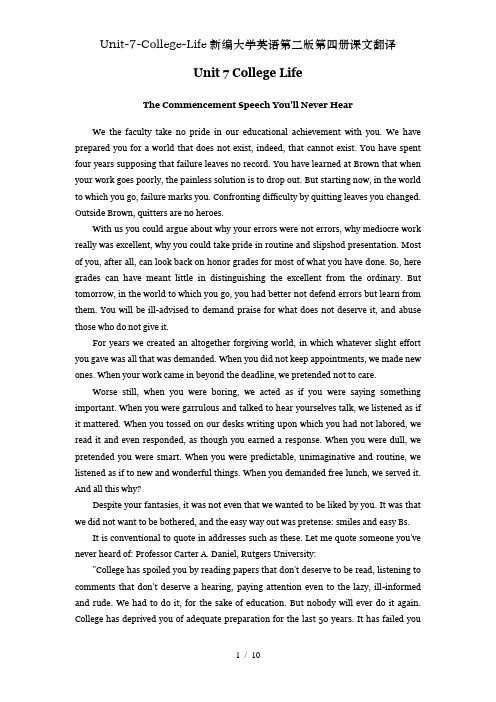
Unit 7 College LifeThe Commencement Speech You'll Never HearWe the faculty take no pride in our educational achievement with you. We have prepared you for a world that does not exist, indeed, that cannot exist. You have spent four years supposing that failure leaves no record. You have learned at Brown that when your work goes poorly, the painless solution is to drop out. But starting now, in the world to which you go, failure marks you. Confronting difficulty by quitting leaves you changed. Outside Brown, quitters are no heroes.With us you could argue about why your errors were not errors, why mediocre work really was excellent, why you could take pride in routine and slipshod presentation. Most of you, after all, can look back on honor grades for most of what you have done. So, here grades can have meant little in distinguishing the excellent from the ordinary. But tomorrow, in the world to which you go, you had better not defend errors but learn from them. You will be ill-advised to demand praise for what does not deserve it, and abuse those who do not give it.For years we created an altogether forgiving world, in which whatever slight effort you gave was all that was demanded. When you did not keep appointments, we made new ones. When your work came in beyond the deadline, we pretended not to care.Worse still, when you were boring, we acted as if you were saying something important. When you were garrulous and talked to hear yourselves talk, we listened as if it mattered. When you tossed on our desks writing upon which you had not labored, we read it and even responded, as though you earned a response. When you were dull, we pretended you were smart. When you were predictable, unimaginative and routine, we listened as if to new and wonderful things. When you demanded free lunch, we served it. And all this why?Despite your fantasies, it was not even that we wanted to be liked by you. It was that we did not want to be bothered, and the easy way out was pretense: smiles and easy Bs.It is conventional to quote in addresses such as these. Let me quote someone you've never heard of: Professor Carter A. Daniel, Rutgers University:"College has spoiled you by reading papers that don't deserve to be read, listening to comments that don't deserve a hearing, paying attention even to the lazy, ill-informed and rude. We had to do it, for the sake of education. But nobody will ever do it again. College has deprived you of adequate preparation for the last 50 years. It has failed youby being easy, free, forgiving, attentive, comfortable, interesting, unchallenging fun. Good luck tomorrow.That is why, on this commencement day, we have nothing in which to take much pride.Oh, yes, there is one more thing. Try not to act toward your co-workers and bosses as you have acted toward us. I mean, when they give you what you want but have not earned, don't abuse them, insult them, act out with them your parlous relationships with your parents. This too we have tolerated. It was, as I said, not to be liked. Few professors actually care whether or not they are liked by peer-paralyzed adolescents, fools so shallow as to imagine professors care not about education but about popularity. It was, again, to be rid of you. So go, unlearn the lies we taught you. To life!你将永远不会听到的毕业演讲1 我们这些教师对于在你们身上取得的教育成就一点都不感到自豪。
Unit 7 College Life新编大学英语第二版第四册教案
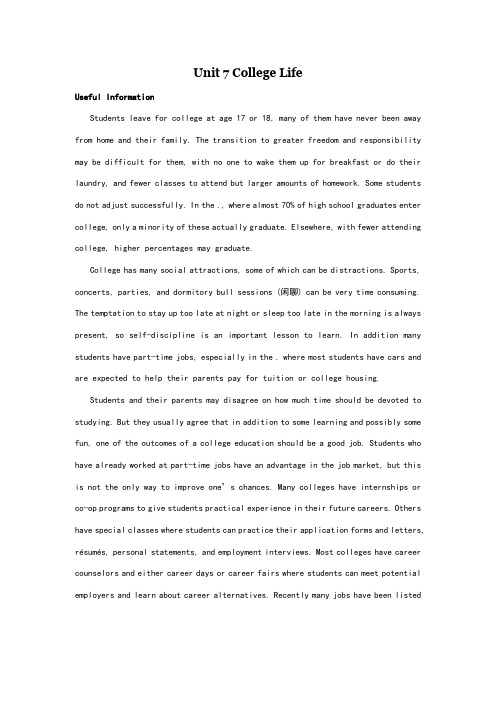
Unit 7 College LifeUseful InformationStudents leave for college at age 17 or 18, many of them have never been away from home and their family. The transition to greater freedom and responsibility may be difficult for them, with no one to wake them up for breakfast or do their laundry, and fewer classes to attend but larger amounts of homework. Some students do not adjust successfully. In the ., where almost 70% of high school graduates enter college, only a minority of these actually graduate. Elsewhere, with fewer attending college, higher percentages may graduate.College has many social attractions, some of which can be distractions. Sports, concerts, parties, and dormitory bull sessions (闲聊) can be very time consuming. The temptation to stay up too late at night or sleep too late in the morning is always present, so self-discipline is an important lesson to learn. In addition many students have part-time jobs, especially in the . where most students have cars and are expected to help their parents pay for tuition or college housing.Students and their parents may disagree on how much time should be devoted to studying. But they usually agree that in addition to some learning and possibly some fun, one of the outcomes of a college education should be a good job. Students who have already worked at part-time jobs have an advantage in the job market, but this is not the only way to improve one’s chances. Many colleges have internships or co-op programs to give students practical experience in their future careers. Others have special classes where students can practice their application forms and letters, résumés, personal statements, and employment interviews. Most colleges have career counselors and either career days or career fairs where students can meet potential employers and learn about career alternatives. Recently many jobs have been listedon the Internet, making it easier to match students with suitable opportunities and more important for students to acquire computer skills.College can be an exciting and rewarding experience, but it can also be very stressful. Making their own decisions can be very difficult for young people accustomed to parental supervision. When students make bad decisions, such as drinking too much beer or procrastinating in their studies, they are not always mature enough to admit or correct their mistakes. But having the freedom to make these mistakes, and the obligation to face their consequences, is part of the learning process. When older people look back on their student years, they usually view this as a happy period of life, even if it did not always feel that way at the time.Parents, teachers, advisors, and counselors can help students move successfully from high school to college and from college to careers. But in the last analysis students must do most of this for themselves, with more help than we may realize from their friends and classmates. College students learn as much outside as inside the classroom, and most of this is not learned from adult authority figures. The peer group and the youthful popular culture are increasingly strong influences on today’s students. So parents and other potential role models should try to be aware of this, even if they don’t always appreciate the latest trends in casual clothing or pop music. College is a time of change, and the parents can learn almost as much from this as the students can. They too were once students, just as today’s students will one day be parents.Part One PREPARATION1. Talking about Your High-School ClassmatesSample:I graduated from __________ High School, a key high school in __________ Province. Among the 50 students in my class, 48 are enrolled in universities, mostly national key universities. Three went to Peking University and two to Tsinghua University. The three who went to Peking University are majoring in Law, Philosophy and Physics respectively and the two who went to Tsinghua University are majoring in Computer Science and Information Science. In this university alone there are five of us, doing different majors; three of my former classmates are enrolled in normal universities, one in Beijing Normal University, one in South China Normal University and one in East China Normal University.2. Talking about Your College Life—Expectations vs RealitySample:1) Campus:Expectations—large and beautiful campus with green grass everywhere and a large sports ground, where you can always see students busy and full of vitality.Reality—Just as what I dreamed of – a huge campus with magnificent modern buildings, green trees, blooming flowers and a river flowing around.—Contrary to what I expected, it’s an old campus, large though, with grey buildings like huge match-boxes, little grass, and a few big trees.2) Classroom buildings:Expectations—large new classrooms with modern facilities.Reality—well equipped teaching buildings with multi-media facilities.—large old buildings, with a few classrooms well equipped with modern facilities.3) Dormitories:Expectations—crowded with little space for everyone.Reality—true, but we may choose to live in a double room if we can afford the rent.4) Students’ cafeterias:Expectations—spacious dining halls, full of hungry students.Reality—true, and there is a great variety of food that will definitely appease our appetite.5) Library:Expectations—a large collection of books, journals and periodicals; spacious and well-lit reading rooms.Reality—true except that the reading rooms are not large enough and students have to get there early in order to find a seat.6) Classmates:Expectations—friendly and speaking different dialects.Reality—true.7) Teachers:Expectations—old, gray-haired and wearing thick glasses; strict and formally dressed.Reality—not true because many teachers are very young, especially English teachers, many teachers do not wear glasses and many teachers wear casual clothes.3. Happy College DaysSample1:The most impressive experience for me is running for the chair of the Student Union. I used to be very timid. That experience, however, helped me gain much confidence. For the first time, I made a public speech and realized, all at once, that I had the potential to organize. One thing that shouldn’t be left out is thatmy friends and classmates gave me enormous support. I did appreciate what they had done for me.Sample 2:I believe that the New Year’s Eve of 2004 can never be erased from my mind. Thousands of students gathered in the auditorium waiting for the new year. We held the lighted candles in our hands, our hearts beating with the rhythm of the music. Minutes went by. When the big clock finally turned straight upward, screams and laughter resonated in the hall. We hugged and said New Year’s greetings to each other. It was such a thrilling moment.4. Ten “Cs” Essential for College Stude nts1) Creativity; 2) Commitment; 3) Connection; 4) Confidence; 5) Courage;6) Cooperation; 7) Curiosity; 8) Competence; 9) Consideration; 10) CommunicationPart Two READING-CENTERED ACTIVITIESIn-Class ReadingPre-Reading1) I 2) F 3) J 4) B 5) G 6) C 7)A 8) E 9) D 10) HPassage ReadingWords, Phrases and Grammatical Points1. You have spent four years supposing that failure leaves no record. (l.2-3, Passage I)这个句子中leave 表示to allow or cause something to stay。
新编大学英语4课后答案完整版
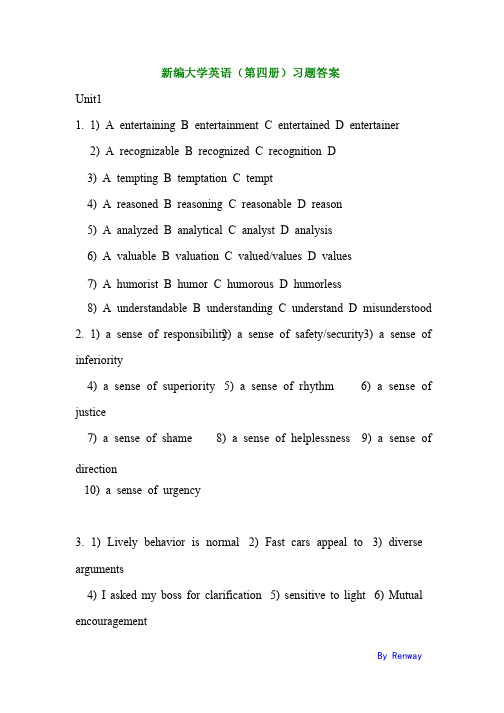
新编大学英语(第四册)习题答案Unit1 1. 1) A entertaining B entertainment C entertained D entertainer 2) A recognizable B recognized C recognition D 3) A tempting B temptation C tempt 3) A tempting B temptation C tempt 4) A reasoned B reasoning C reasonable D reason 4) A reasoned B reasoning C reasonable D reason 5) A analyzed B analytical C analyst D analysis 5) A analyzed B analytical C analyst D analysis 6) A valuable B valuation C valued/values D values 6) A valuable B valuation C valued/values D values 7) A humorist B humor C humorous D humorless 7) A humorist B humor C humorous D humorless 8) A understandable B understanding C understand D misunderstood 8) A understandable B understanding C understand D misunderstood 2. 1) a sense of responsibility 2) a sense of safety/security 3) a sense of inferiority 4) a sense of superiority 4) a sense of superiority 5) a sense of rhythm 6) a sense of justice 7) a sense of shame 7) a sense of shame 8) a sense of helplessness 9) a sense of direction 10) a sense of urgency 3. 3. 1) 1) 1) Lively Lively Lively behavior behavior behavior is is is normal normal 2) 2) Fast Fast Fast cars cars cars appeal appeal appeal to to 3) 3) diverse diverse arguments 4) 4) 4) I I I asked asked asked my my my boss boss boss for for for clarification clarification 5) 5) sensitive sensitive sensitive to to to light light 6) 6) Mutual Mutual encouragement 7) made fun of him 7) made fun of him 8) persists in his opinion/viewpoint 9) to to be be be the the the focus/center focus/center focus/center of attention of attention 10) 10) 10) we we we buy buy buy our our our tickets tickets tickets in in advance 4. 4. 1) 1) 1) certain/sure certain/sure 2) 2) involved involved 3) 3) end end 4) 4) behavior behavior 5) 5) disciplining disciplining 6) agreed 7) 7) individually 8) first 9) response 9) response 10) question 10) question 11) attempt 11) attempt 12) 12) voice 13) directly 13) directly 14) followed 15) trouble 15) trouble Unit2 Column A Column B The Compound Words created through day throughout up man upbeat, uplift draw eared drawback teen ready teenage hand conscious handout, handwritten birth back birthday, birthstone chair distance chairman rag beat rag-eared ever lift ever-ready over age overdue, overage long due long-distance, long-eared self stone self-conscious mile out mileage, milestone type wishing typewriter, typewritten well Writer/written well-wishing, well-written Step Two 1) long-distance 2) upbeat 3) ever-ready 3) ever-ready 4) overdue 4) overdue 5) typewriter 5) typewriter 6) 6) milestone milestone 7) 7) handwritten handwritten 8) 8) uplifted uplifted 9) 9) self-conscious self-conscious 10) 10) rag-eared 11) 11) birthday birthday 12) 12) throughout throughout 13) 13) drawbacks drawbacks 14) 14) chairman chairman 15) 15) teenage 2. 1) A. intrigued v. interest B. B. intrigue intrigue n . n. n. the the the act act act or or or practice practice practice of of of secretly secretly secretly planning planning planning to to to harm harm someone or make them lose their position of power 2) 2) A. A. A. straining straining v . v. v. try try try very very very hard hard hard to to to do do do something something something using using using all all all your your physical or mental strength B. strain n. n. a a force that stretches, pulls or puts pressure on something 3) A. savor n. taste; flavor B. savored v. enjoy the taste or flavor of; enjoy as much as you can 4) A. treasure v. treat something as being very special, important, or valuable B. treasure n. a store of gold, silver, jewels, etc. 5) A. credited v. consider … as having achieved something or being the reason for it B. credit n. trust; faith 6) A. boost n. an encouraging act of cheering somebody up B. boost v. make someone feel more confident and less worried 7) A. note n. a short, usually informal, letter B. noted v. notice or pay careful attention to something 8) A. signed v. write your signature on a letter or document to show that you wrote it, agreed with it B. sign n. gesture used to ex press one’s meaning, idea, etc. 9) A. totaled v. come to a certain amount B. total n. the whole amount 10) A. stuffed v. fill something with a substance 10) A. stuffed B. stuff n. substance or material 11) A. count n. the number that is reached when something is being 11) A. count counted B. count v. be important 12) A. last v. manage to remain in the same situation 12) A. last B. last n. the remaining part of something 13) A. complimented 13) A. complimented v. express praise or admiration of somebody B. compliment n. an expression of praise, admiration, approval, etc. 14) A. flood 14) A. flood n. a large number or amount B. flooding v. arrive in large numbers 15) A. contact 15) A. contact n. communication with a person, organization, country, etc. B. contact v. reach (someone) by message, telephone, etc. 3. 3. 1) 1) 1) thrives thrives 2) 2) strategy strategy 3) 3) annual annual 4) 4) deserve deserve 5) 5) spontaneous spontaneous 6) sincere 7) investments 8) 8) enterprise enterprise 9) 9) follow follow follow up up 10) 10) characterized characterized 11) lingered 12) acknowledged 4. column 1) D 1) D 2) A 2) A 3) B 3) B 4) C 4) C tough 1) D 2) B 2) B 3) E 3) E 4) F 4) F 5) 5) C 6) A 6. 1) searched 2) clever 3) solution 4) wasted 5) tolerate 6) hidden 7) dumb 8) subject 9) noise 10) extra 11) purchased 12) replaced 13) appreciation 14) hurried 15) warrant 16) strange Unit 3 Understanding the Organization of the Text (1) Introduction (para 1) It has has been been been proven proven proven repeatedly repeatedly repeatedly that that that the the the various various various types types types of of of behavior, behavior, emotions, and interests that constitute being masculine and feminine are patterned by both heredity and culture. (2) There is a cultural bias in education that favors boys over girls. (para. 2-4) Supporting evidence A. Teachers called on males in class far more than on female students. (para 2) i) Its Its consequence: consequence: consequence: This This This has has has a a a tremendous tremendous tremendous impact impact impact on on on the the the learning learning process. i i) ii) The The reason reason reason for for for this: this: this: Active Active Active classroom classroom classroom participants participants participants develop develop develop more more positive attitudes and go on to higher achievement. i ii) Two examples: iii) Two examples: a. In In many many many of of of the the the former former former all-women all-women ’s s colleges, colleges, colleges, the the the boys boys boys were were taking over the class-room discussions and active participation by women students had diminished noticeably. b. A A similar similar similar subordination subordination subordination of of of female female female to to to male male male students students students has has has also also been observed in law and medical school classrooms in recent years. B. B. Teachers Teachers assigned boys and girls different tasks according to stereotyped gender roles. (para. 3) i ) i) Its consequence: This prevented girls from participating as actively as boys in class. i i) ii) An An example: example: example: A A A teacher teacher teacher had had had the the the little little little boys boys boys perform perform perform the the the scientific scientific experiment experiment while while while the the the girls girls girls were were were given given given the the the task task task of of of putting putting putting the the the materials materials away. C. Gender-biased Gender-biased education education education is is is also also also reflected reflected reflected in in in the the the typical typical typical American American teacher ’ assumption. (para 4) i) The The assumption: assumption: assumption: Boys Boys Boys will will will do do do better better better in in in the the the hard, hard, hard, masculine masculine subjects of math and science while girls are expected to have better verbal and reading skills. i i) Three examples: ii) Three examples: a. American boys do develop reading problems, while girls, who are superior to boys in math up to the age of nine, fall behind from then on. b. b. In In In Germany, Germany, Germany, all all all studies studies studies are are are considered considered considered masculine masculine masculine and and and it it it is is is girls girls who develop reading problems. c. In Japan, where early education appears to be nonsexist, both girls and boys do equally well in reading. (3) The educational bias begins at home. (para 5) A . A. S upporting evidence: Supporting evidence: i) Boy Boy preschoolers preschoolers preschoolers were were were permitted permitted permitted to to to go go go away away away from from from home home home in in in a a much wider area than girl preschoolers. ii) B oys Boys Boys were were were encouraged encouraged encouraged to to to develop develop develop intellectual intellectual intellectual curiosity curiosity curiosity and and physical skills, while girls are filled with fears of the world outside the home home and and and with with with the the the desire desire desire to to to be be be approved approved approved of of of for for for their their their goodness goodness goodness and and obedience to rules. B. T he consequence when these lessons carry over from the home to The consequence when these lessons carry over from the home to the classroom: Girls are generally observed to be more dependent on the teacher, more concerned with the form and neatness of their work than its content, content, and and and more more more anxious anxious anxious about about about being being being right right right in in in their their their answers answers answers than than than in in being intellectually independent, analytical, or original. C. Conclusion: Through the educational process that occupies most of the the child child ’s s waking hours, waking hours, society society reinforces reinforces reinforces its its its established established established values values values and and turns out each sex in its traditional and expected mold. V ocabulary 1. 1) genetic genetic 2) 2) assign assign 3) 3) noticeably noticeably 4) 4) approved approved 5) 5) Bias Bias 6) 6) deprived 7) constituted 8) participation 9) unintentional 10) postgraduate 10) postgraduate 2.conscious- unconscious encourage- discourage directly- indirectly sexist –nonsexist dependent- independent positive –negative superior - inferior biased –fair limited –unlimited appropriately- inappropriately 6) C 7) F 7) F 8) B 5) B 6) C 8) B 3. 1) C C 2) D 3) A 3) A 4) E 4) E 5) B 4. 1) turn out 2) carry over 2) carry over 3) calling on 3) calling on 4) put away 4) put away 5) fallen behind 5) fallen behind 6) take over 6) take over unit4 Reading Comprehension 1. 1) Introduction(para 1) It is introduced in the article how teachers and parents can encourage creativity in children. 2) An important strategy for parents and teachers to follow (para. 2-3) 2) An important strategy for parents and teachers to follow (para. 2-3) A. The strategy: To encourage children to spend time thinking and developing new ideas. B. The significance for adopting the strategy: If children can be taught to think creatively, they will be better able to function in tomorrow ’s society. 3) The definition of creativity (para. 4-5) 3) The definition of creativity (para. 4-5) A. Who successful students and adults are: Those who can find a number of ways to approach problems. B. What creative people can do: They can use what they have to produce original ideas that are good for something. 4) 4) A big problem in school (para. 6) The The problem: problem: problem: Children Children Children can can can obtain obtain obtain and and and give give give back back back information, information, information, but but can ’t figure out ways to apply what they know in new situations. 5) A new approach to teaching (para 7) A. A. The The The approach: approach: approach: Combining Combining Combining the the the basics basics basics with with with the the the activities activities activities where where students must use their imaginations. B. How How to to to do so: do so: By By asking asking asking questions questions questions and and and meanwhile praising meanwhile praising their ideas and new thoughts. C. C. How How How to to to facilitate facilitate facilitate the the the process: process: process: To To To create create create an an an atmosphere atmosphere atmosphere in in in which which there is no risk risk in in in being being being creative-- creative-- creative-- a a a place place place where where where wild wild wild ideas ideas ideas are are are honored honored honored and and valued, never scorned or dismissed. 6) 6) Things parents can do at home to encourage creativity (para. 8-10) A. To involve children in decision making. B. To help help children children children to to to understand understand understand the the the consequences consequences consequences of of of various various decisions. C. To To encourage encourage encourage them them them to to talk talk out loud out loud about about things things things they they they are are are doing. doing. The reason for for doing doing doing so: so: so: Talking Talking out out loud loud loud improves improves improves language language language skills skills skills and and thinking skills. D. To show a sense of humor. The reason for doing so: Children can see creativity in its purest form. E. To give children choices from their earliest age. Examples: a. When When they they they are are are very very very young, young, young, let let let them them them choose choose choose between between between two two two food food items for lunch. b. B. When they grow older, let them decide how to use their time or spend their money. V ocabulary 3. 3. 1) 1) 1) dismiss dismiss 2) 2) consequences consequences 3) promoting 4) 4) applies applies 5) 5) vital vital 6) scorned 7) conventional 8) original 8) original 4. 4. 1) 1) 1) consciously consciously 2) 2) innovative innovative 3) 3) unconsciously unconsciously 4) 4) determined determined 5) Imagination 6) 6) aware aware 7) 7) control control 8) 8) created created 9) 9) extension extension 10) 10) technique technique 11) vulnerable 12) unfolding 12) unfolding 13) joyful 13) joyful 14) gain 14) gain 15) Apply 15) Apply Unit5 Understanding the organization of the text 1) Introduction (para. 1) Athletes are chosen to be role models, and they can choose only to be good or bad ones. 2) Athletes should be role models. (para. 2-5) The author ’s arguments: A. A. Athletes Athletes Athletes should should should not not not refuse refuse refuse the the the responsibility responsibility responsibility of of of being being being a a a role role role model model while a ccepting all the glory and the money that comes with being a famous accepting all the glory and the money that comes with being a famous athlete. (para. 2) (para. 2) B. I try to be a positive role model, but that doesn ’t mean I am perfect. (para. 3) C. Qualities of a positive role model: (para. 4) a. He influences people ’s lives in a positive way. b. He gives of himself in time or money to help those who look up to him. c. He displays the values like honesty and determination. D. Athletes cannot take the place of parents, but can help reinforce what parents try to teach their children. (para. 5) 3) People sometimes expect so much that some athletes don ’t want to be role modes. (para. 6-7) A. Sometimes people put athletes on a pedestal. Example: I have had parents in Utah put my picture on the wall beside Jesus Christ. (para. 6) B. Constantly being watched by the public can be hard to tolerate at times. Example: 1: Negative publicity Michael Jordan received about gambling. 2. Ever since I played on the Dream Team, I can ’t go anywhere without being the center of attention and I can ’t even buy a motorcycle I really want. (para. 7) 4) Conclusion (para 8-9) The good things about being a role model outweigh the bad. A. It ’s s a a a great great great feeling feeling feeling to to to think think think you you you are are are part part part of of of the the the reason reason reason that that that a a a id id decided to try to be good. B. But parents should remind their kids that there are no perfect human beings. C. Charles Barkley is a good role model. V ocabulary 2. 1) is bound to 2) follow their lead 3) goes too far/is going too far 4) take the place of 5) dropped out 6) have a fit 7) measure up to 8) look up to 9) Let ’s face it 10) you name it 3. 3. 1) outgrown 1) outgrown 2) outdo 3) outwitted 3) outwitted 4) outweigh 4) outweigh 5) outlived 5) outlived UNIT 7 1. belief – doubt deep- shallow learn- unlearn shame- pride inadequate-adequate success- failure boring- interesting dependent-independent mediocre-excellent uselessuseful well-informed ---- ill-informed smart- dull painful-painless imaginativeunimaginative 2. 2. 1) 1) 1) deprived deprived deprived of of 2) for for the the the sake sake sake of of 3) 3) get get away away away with with 4) 4) dropped dropped out 5) by no means 6) got got down down down to to 7) 7) 7) distinguish distinguish …from 8) 8) look look look back back back on on 9) 9) 9) gone gone through 10) after all 11) be rid of 12) on my own 3. choice secure hear who keep while now This pressure expecting tests within had catch marks patents obtain/get teachers relax shape UNIT 8 1. C E B D A F 2. relearn 再学习 r egain regain 收回,重新获得 redo 重做,再做 r ewrite rewrite重写,改写重写,改写 r earrange rearrange 重新整理 r eclaim reclaim 要求归还,收回 r emodel remodel 重新塑造,改变 replace 取代取代 rephrase 重新措辞 r ejoin rejoin 再结合,在加入 reform reform 改革 readjust 重新调整重新调整 r eunited reunited (使)再结合 r ebroadcast rebroadcast 转播,重播 reread 再读 r eview review 复习复习3. B A D A D C A A A B UNIT 9 1. 1) observation observation 2) 2) available available 3) 3) discoveries discoveries 4) 4) acceptance acceptance 5) 5) experimentation 6) inventions 7) evolution evolution 8) 8) adaptable 9) 9) innovative innovative 10) 10) objectivity 2. 1) out of the ordinary 2) preceded 3) To be exact 4) Contradict(ed) 5) Prosperity COLUMN A COLUMN B Invention invent available nnovate Adaptable Adapt Discovery Discover Acceptance Accept Evolution Evolve Objectivity Objective Observation Observe Experimentation Experiment Prosperity Prosper disastrous disaster 6) Gave birth to 7) Catch our breath 8) had in mind 9) proposed 10) converted 11) disastrous 12) negative 3. 1) She had hardly sat down 2) Especially if/ when you want to reserve a seat 2) Especially if/ when you want to reserve a seat 3) is not necessarily the most useful 3) is not necessarily the most useful 4) What sort/kind of person do you have in mind 4) What sort/kind of person do you have in mind 5) There5) There’s a limit on the time 6) Spend part of his childhood 6) Spend part of his childhood 7) three times as many girls as boys 7) three times as many girls as boys 8) as do most of the people who live in this village 8) as do most of the people who live in this village 9) but on the other hand it would be sad to lose the family atmosphere 9) but on the other hand it would be sad to lose the family atmosphere 10) Depite/ In spite of international pressure 10) Depite/ In spite of international pressure 。
- 1、下载文档前请自行甄别文档内容的完整性,平台不提供额外的编辑、内容补充、找答案等附加服务。
- 2、"仅部分预览"的文档,不可在线预览部分如存在完整性等问题,可反馈申请退款(可完整预览的文档不适用该条件!)。
- 3、如文档侵犯您的权益,请联系客服反馈,我们会尽快为您处理(人工客服工作时间:9:00-18:30)。
College Life
Ten “Cs” Essential for College Students
Creativity Commitment Connection Confidence Courage
Cooperation Communication Competence Consideration Curiosity
Mechanics
Biochemistry International
Trade Economics International
Finance Agronomy
Earth Science Materials
Life Science
Diplomatic Relations
Urban Planning
Two different attitudes toward errors.
(Para. 2)
At Brown, students defend their errors by arguing about:
A. why their errors were not errors; B. why mediocre work was excellent; C. why they could take pride in their poor
1910s — 1920s college students
1960s — 1970s college students
Present day college students
The message Prof. Neusner passes to the graduates. (Para. 1)
Majors:
Mathematics Mechanical
ering
Chemical Engineering
Electrical Engineering
Civil Engineering
Geology
Information Science
Computer Science
Mass Media Journalism
Talking about Your College Life — Expectations vs. Reality
Directions: Work in groups and discuss: 1) your idea of college life before you came to college
Do you know this?
全国重点大学 综合性大学 师范大学/学院 工业大学/理工学院
财经大学/学院 专科学校 职业学校 寄宿学校
national key university
comprehensive university
normal university / college poly-technical university / institute of technology university / institute of finance and economics junior college vocational school boarding school
Guidelines
1) Campus: 2) Classroom
buildings: 3) Dormitories: 4) Students’
cafeterias: 5) Library: 6) Classmates:
7) Teachers:
expectations Reality
Large & beautiful As what dreamed
new classrooms with equipped with modern facilities modern facilities
space for everyone Small & crowded
spacious dining halls
great variety of food
large collection of Scare reading
We take no pride in our educational achievement because we have inadequately prepared students for the real world.
Reason: At Brown, during the four years, students have formed the belief that failure leaves no record, while in the real world failure marks you.
(including the campus, classroom buildings, dormitories, students’ cafeterias, library, classmates, teachers, etc.);
2) the similarities and differences between your expectations and the reality.
books
room
friendly old
true Young, especially
English teachers
College Students at Different Times
Directions: Look at the pictures of college students in 1910s20s, 1960s-70s, as well as college students today. Work in groups to compare and contrast their characteristics according to what you see or what you know about them. Then report your findings to the class.
presentation. In the real world, graduates had better not defend their errors but learn from them.
